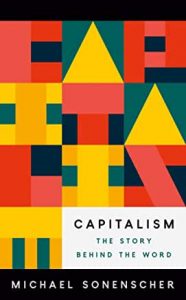Capitalism: The Story Behind The Word by Michael Sonenscher is an enjoyable short read (with a great cover) that does what the subtitle says. It compares the history of ‘capitalism’ with the history of the idea of ‘commercial society’ and the division of labour, making the case that the two referred to different economic arenas. Capitalism concerned capitalists: people who lent money to governments to fund war and other expenditure. It was thus a concept relating to public finance and taxation, and concerned with private property. Commercial society and the division of labour were concepts used in broader societal debates about the organisation of production, markets and prices – issues that predate the general use of the word ‘capitalism’. The essay argues that the distinction is worth keeping, although this may be a losing battle as ‘capitalism’ has swallowed the wider issues – and much of the wider contemporary literature on these latter has been largely forgotten.
Among other things, a quotation from Hegel struck me: “Money is not in fact one particular resource among others; on the contrary it is the universal aspect of all of them, in so far as they express themselves as an external existence in which they can be apprehended as things. Only at this extreme point of externality is it possible to determine services quantitatively and so in a just and equitable manner.” (This is obviously not the modern usage of the term ‘externality’.) I was surprised to see a rationale for using the measuring rod of money as a common standard from this author.

